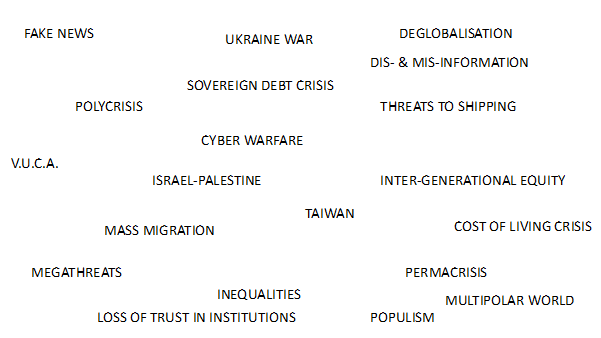Tags:
In this blog, IBE Chair, Professor David Grayson asks if business can lead the way on sustainable development and social justice in the face of geo-strategic threats.
I was asked recently, how the complex geo-strategic situation related – if it does – to sustainable development and sustainable business.
It is something which has been on my mind for a while. There is no shortage of issues!

The refugee crisis and mass migration (war, climate and economic-related) are provoking demagogues and populism of a most ugly character. The war in Ukraine, the war in Gaza and the ever-present risk of that conflict spreading across the Middle East, tensions over Taiwan, concerns over freedom of navigation whether in the South China Sea or the Red Sea, failing narco-states and a scarily escalating number of other regional conflicts, all combine to make the world feel a much more dangerous place again. Indeed, it feels to me like the most dangerous time in my lifetime (and as a very young kid in primary school, I vividly remember talking in the school playground, during the 1962 Cuban missile crisis, with friends that we were too young to die!). International financiers like Jamie Dimon and Larry Fink have suggested it may even be the most dangerous time since 1938.
It would be absurd to think that sustainable development and the sustainable business agenda are unaffected by these multiple, geo-strategic threats.
These threats mean governments, political leaders and parliamentarians have less “airtime”/bandwidth or budgets to devote to sustainable development or to create an enabling environment for sustainable businesses to flourish. The bandwidth to think long-term for the planet will be diminished.
The likely further rise in populism means we cannot rely on politicians to show that visionary leadership that sustainable development needs. But business leaders are, after all, inevitably dealing with the same geo-strategic threats. These threats consume the time and thought processes of corporate boards and Senior Management Teams (SMTs), as they grapple with risks to their global supply chains, for example, or consumer confidence. Can they step into this role?
The Global Risks Report for 2024 from the World Economic Forum defines disinformation and misinformation caused by Artificial Intelligence as the top, immediate risk. Media attention has inevitably focused on the potential impacts on politics – especially in an unprecedented year for the number of elections across the world when half of the world’s population will be eligible to vote this year. Dis and misinformation, however, pose serious threats for businesses too. Geopolitical Strategist Tina Fordham describes this new reality as “a new geopolitical risk supercycle.” Fordham is one of several consultants advising boards on what they need to understand about this “risk supercycle” and possible impacts on their businesses.
In a year with such a proliferation of elections, companies will have to be especially mindful of their Corporate Political Responsibility (CPR). One source of advice on CPR is the Erb Principles on Corporate Political Responsibility developed by the Erb Institute at the University of Michigan in the USA.
Boards and SMTs will need to consider how different geo-strategic risks might affect their business, and which of these might demand a corporate point of view. Especially how might some of the disparate threats coalesce and produce more threats?
Certainly, heads of sustainability/Chief Sustainability Officers need to be engaging even more intensively with their colleagues in corporate strategy and risk functions.
There is less likelihood of being “blown off course” if the business has already done the hard work and is clear about why and how sustainability is crucial to its future success; has a robust strategy with clear accountabilities and targets; is measuring and reporting on progress – and is using this to drive continuous improvement. Similarly, the board and senior management team must be clear about the desired culture of their organisation, effectively checking on actual and desired culture and driving continuous improvement. The message has to be: continue to work with other businesses committed to doing business ethically and sustainably – and do not be afraid to speak up for long-term policies that will advance sustainable development and social justice.
Author

Professor David Grayson CBE
Chair
David is Emeritus Professor of Corporate Responsibility at Cranfield School of Management. From 2007-2017, he was director of the Doughty Centre for Corporate Responsibility and Professor of Corporate Responsibility.
David became Chair of the Trustees Board on 01 April 2019.
He joined Cranfield in April 2007, after a thirty year career as a social entrepreneur and campaigner for responsible business, diversity, and small business development. This included founding Project North East which has now worked in nearly 60 countries around the world; being the founding CEO of the Prince's Youth Business Trust and serving as a managing-director of Business in the Community.
David has an Honorary Doctorate of Law from London South Bank University and was a visiting Senior Fellow at the CSR Initiative of the Kennedy School of Government, Harvard (2005-10).
He has served on various charity and public sector boards over the past 35 years. These have included the boards of the National Co-operative Development Agency, The Prince of Wales' Innovation Trust and the Strategic Rail Authority. He chaired the National Disability Council and the Business Link Accreditation Board; in each case appointed by the Major Government and re-appointed by the Blair administration. David now serves on the board of a financial services company in Asia where he leads on embedding ESG/sustainability and chairs the board’s Group Risk Management Committee.
He has previously chaired the national charity Carers UK and one of the UK's larger social enterprises and largest eldercare providers, Housing 21 during which the organisation made corporate history by becoming the first-ever not-for-profit successfully to acquire a publicly quoted group of companies. David received an OBE for services to industry in 1994 and a CBE for services to disability in 1999. He is a Companion of the Chartered Institute of Management.
David has written a number of books on responsible business and corporate sustainability including most recently: ‘All in - The Future of Business Leadership’ and The Sustainable Business Handbook – both with Chris Coulter and Mark Lee. He is part of the faculty of the Forward Institute and of the Circle of Advisers for Business Fights Poverty.
The Guardian has named David as one of ten top global tweeters on sustainable leadership alongside Al Gore, Tim Cook - CEO of Apple, and Facebook's COO Sheryl Sandberg.
